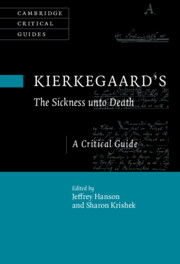Book contents
- Kierkegaard’s The Sickness unto Death
- Cambridge Critical Guides
- Kierkegaard’s The Sickness unto Death
- Copyright page
- Contents
- Contributors
- Acknowledgments
- Abbreviations
- Introduction
- Chapter 1 Kierkegaard’s Place of Rest
- Chapter 2 Publishing The Sickness unto Death
- Chapter 3 Kierkegaard on the Self and the Modern Debate on Selfhood
- Chapter 4 From Here to Eternity
- Chapter 5 Kierkegaard’s Metaphysics of the Self
- Chapter 6 The Experience of Possibility (and of Its Absence)
- Chapter 7 Sin, Despair, and the Self
- Chapter 8 Sin and Virtues
- Chapter 9 Despair as Sin
- Chapter 10 Fastening the End and Knotting the Thread
- Chapter 11 Despair the Disease and Faith the Therapeutic Cure
- Chapter 12 The Long Journey to Oneself
- Chapter 13 Accountability to God in The Sickness unto Death
- Bibliography
- Index
- Cambridge Critical Guides
Chapter 3 - Kierkegaard on the Self and the Modern Debate on Selfhood
Published online by Cambridge University Press: 26 August 2022
- Kierkegaard’s The Sickness unto Death
- Cambridge Critical Guides
- Kierkegaard’s The Sickness unto Death
- Copyright page
- Contents
- Contributors
- Acknowledgments
- Abbreviations
- Introduction
- Chapter 1 Kierkegaard’s Place of Rest
- Chapter 2 Publishing The Sickness unto Death
- Chapter 3 Kierkegaard on the Self and the Modern Debate on Selfhood
- Chapter 4 From Here to Eternity
- Chapter 5 Kierkegaard’s Metaphysics of the Self
- Chapter 6 The Experience of Possibility (and of Its Absence)
- Chapter 7 Sin, Despair, and the Self
- Chapter 8 Sin and Virtues
- Chapter 9 Despair as Sin
- Chapter 10 Fastening the End and Knotting the Thread
- Chapter 11 Despair the Disease and Faith the Therapeutic Cure
- Chapter 12 The Long Journey to Oneself
- Chapter 13 Accountability to God in The Sickness unto Death
- Bibliography
- Index
- Cambridge Critical Guides
Summary
This chapter unpacks the dense statement that Kierkegaard gives of his ontology of the self at the start of The Sickness unto Death. It considers the claims that the self is a synthesis of factors that stand in tension with one another (the finite and the infinite, etc.); that it is not simply a relation but a dynamic, continuing process of relating to itself; that it is only able to be this because it relates to another (God); and that selfhood, so considered, is a goal which human beings fall short of attaining. Throughout, Kierkegaard’s thought is explicated by comparison and contrast with other philosophical accounts of the self, referring to Descartes, Locke, Fichte, Heidegger, Sartre and Frankfurt; and the continuing relevance of Kierkegaard’s account to recent discussions of selfhood, the relation of the self or person to the human being, and the extent to which the self can be thought of as self-constituted is emphasized.
- Type
- Chapter
- Information
- Kierkegaard's The Sickness Unto DeathA Critical Guide, pp. 42 - 60Publisher: Cambridge University PressPrint publication year: 2022
- 1
- Cited by



